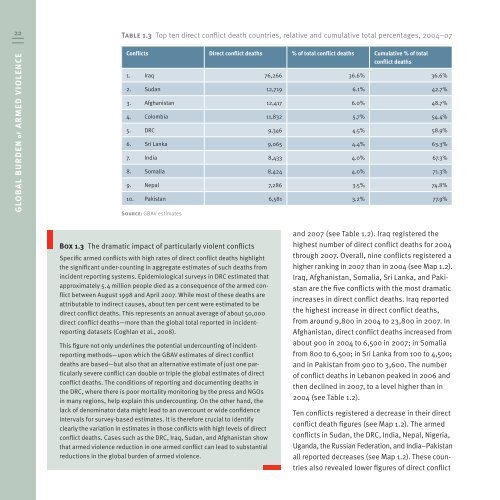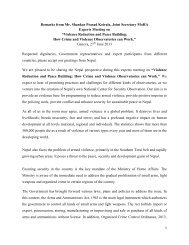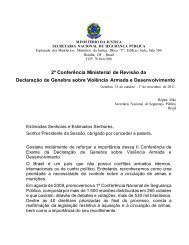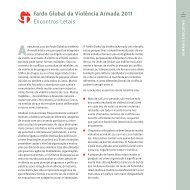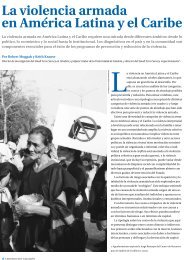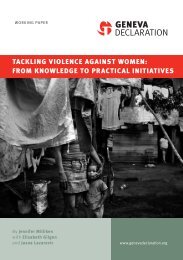Global Burden of Armed Violence - The Geneva Declaration on ...
Global Burden of Armed Violence - The Geneva Declaration on ...
Global Burden of Armed Violence - The Geneva Declaration on ...
Create successful ePaper yourself
Turn your PDF publications into a flip-book with our unique Google optimized e-Paper software.
22 Table 1.3 Top ten direct c<strong>on</strong>flict death countries, relative and cumulative total percentages, 2004–07<br />
GLOBAL BURDEN <str<strong>on</strong>g>of</str<strong>on</strong>g> ARMED VIOLENCE<br />
C<strong>on</strong>flicts Direct c<strong>on</strong>flict deaths % <str<strong>on</strong>g>of</str<strong>on</strong>g> total c<strong>on</strong>flict deaths Cumulative % <str<strong>on</strong>g>of</str<strong>on</strong>g> total<br />
c<strong>on</strong>flict deaths<br />
1. Iraq<br />
76,266 36.6% 36.6%<br />
2. Sudan<br />
12,719 6.1% 42.7%<br />
3. Afghanistan<br />
12,417 6.0% 48.7%<br />
4. Colombia<br />
11,832 5.7% 54.4%<br />
5. DRC<br />
9,346 4.5% 58.9%<br />
6. Sri Lanka<br />
9,065 4.4% 63.3%<br />
7. India<br />
8,433 4.0% 67.3%<br />
8. Somalia<br />
8,424 4.0% 71.3%<br />
9. Nepal<br />
7,286 3.5% 74.8%<br />
10. Pakistan<br />
6,581 3.2% 77.9%<br />
Source: GBAV estimates<br />
Box 1.3 <str<strong>on</strong>g>The</str<strong>on</strong>g> dramatic impact <str<strong>on</strong>g>of</str<strong>on</strong>g> particularly violent c<strong>on</strong>flicts<br />
Specific armed c<strong>on</strong>flicts with high rates <str<strong>on</strong>g>of</str<strong>on</strong>g> direct c<strong>on</strong>flict deaths highlight<br />
the significant under-counting in aggregate estimates <str<strong>on</strong>g>of</str<strong>on</strong>g> such deaths from<br />
incident reporting systems. Epidemiological surveys in DRC estimated that<br />
approximately 5.4 milli<strong>on</strong> people died as a c<strong>on</strong>sequence <str<strong>on</strong>g>of</str<strong>on</strong>g> the armed c<strong>on</strong>flict<br />
between August 1998 and April 2007. While most <str<strong>on</strong>g>of</str<strong>on</strong>g> these deaths are<br />
attributable to indirect causes, about ten per cent were estimated to be<br />
direct c<strong>on</strong>flict deaths. This represents an annual average <str<strong>on</strong>g>of</str<strong>on</strong>g> about 50,000<br />
direct c<strong>on</strong>flict deaths—more than the global total reported in incidentreporting<br />
datasets (Coghlan et al., 2008).<br />
This figure not <strong>on</strong>ly underlines the potential undercounting <str<strong>on</strong>g>of</str<strong>on</strong>g> incidentreporting<br />
methods—up<strong>on</strong> which the GBAV estimates <str<strong>on</strong>g>of</str<strong>on</strong>g> direct c<strong>on</strong>flict<br />
deaths are based—but also that an alternative estimate <str<strong>on</strong>g>of</str<strong>on</strong>g> just <strong>on</strong>e particularly<br />
severe c<strong>on</strong>flict can double or triple the global estimates <str<strong>on</strong>g>of</str<strong>on</strong>g> direct<br />
c<strong>on</strong>flict deaths. <str<strong>on</strong>g>The</str<strong>on</strong>g> c<strong>on</strong>diti<strong>on</strong>s <str<strong>on</strong>g>of</str<strong>on</strong>g> reporting and documenting deaths in<br />
the DRC, where there is poor mortality m<strong>on</strong>itoring by the press and NGOs<br />
in many regi<strong>on</strong>s, help explain this undercounting. On the other hand, the<br />
lack <str<strong>on</strong>g>of</str<strong>on</strong>g> denominator data might lead to an overcount or wide c<strong>on</strong>fidence<br />
intervals for survey-based estimates. It is therefore crucial to identify<br />
clearly the variati<strong>on</strong> in estimates in those c<strong>on</strong>flicts with high levels <str<strong>on</strong>g>of</str<strong>on</strong>g> direct<br />
c<strong>on</strong>flict deaths. Cases such as the DRC, Iraq, Sudan, and Afghanistan show<br />
that armed violence reducti<strong>on</strong> in <strong>on</strong>e armed c<strong>on</strong>flict can lead to substantial<br />
reducti<strong>on</strong>s in the global burden <str<strong>on</strong>g>of</str<strong>on</strong>g> armed violence.<br />
and 2007 (see Table 1.2). Iraq registered the<br />
highest number <str<strong>on</strong>g>of</str<strong>on</strong>g> direct c<strong>on</strong>flict deaths for 2004<br />
through 2007. Overall, nine c<strong>on</strong>flicts registered a<br />
higher ranking in 2007 than in 2004 (see Map 1.2).<br />
Iraq, Afghanistan, Somalia, Sri Lanka, and Pakistan<br />
are the five c<strong>on</strong>flicts with the most dramatic<br />
increases in direct c<strong>on</strong>flict deaths. Iraq reported<br />
the highest increase in direct c<strong>on</strong>flict deaths,<br />
from around 9,800 in 2004 to 23,800 in 2007. In<br />
Afghanistan, direct c<strong>on</strong>flict deaths increased from<br />
about 900 in 2004 to 6,500 in 2007; in Somalia<br />
from 800 to 6,500; in Sri Lanka from 100 to 4,500;<br />
and in Pakistan from 900 to 3,600. <str<strong>on</strong>g>The</str<strong>on</strong>g> number<br />
<str<strong>on</strong>g>of</str<strong>on</strong>g> c<strong>on</strong>flict deaths in Leban<strong>on</strong> peaked in 2006 and<br />
then declined in 2007, to a level higher than in<br />
2004 (see Table 1.2).<br />
Ten c<strong>on</strong>flicts registered a decrease in their direct<br />
c<strong>on</strong>flict death figures (see Map 1.2). <str<strong>on</strong>g>The</str<strong>on</strong>g> armed<br />
c<strong>on</strong>flicts in Sudan, the DRC, India, Nepal, Nigeria,<br />
Uganda, the Russian Federati<strong>on</strong>, and India–Pakistan<br />
all reported decreases (see Map 1.2). <str<strong>on</strong>g>The</str<strong>on</strong>g>se countries<br />
also revealed lower figures <str<strong>on</strong>g>of</str<strong>on</strong>g> direct c<strong>on</strong>flict


